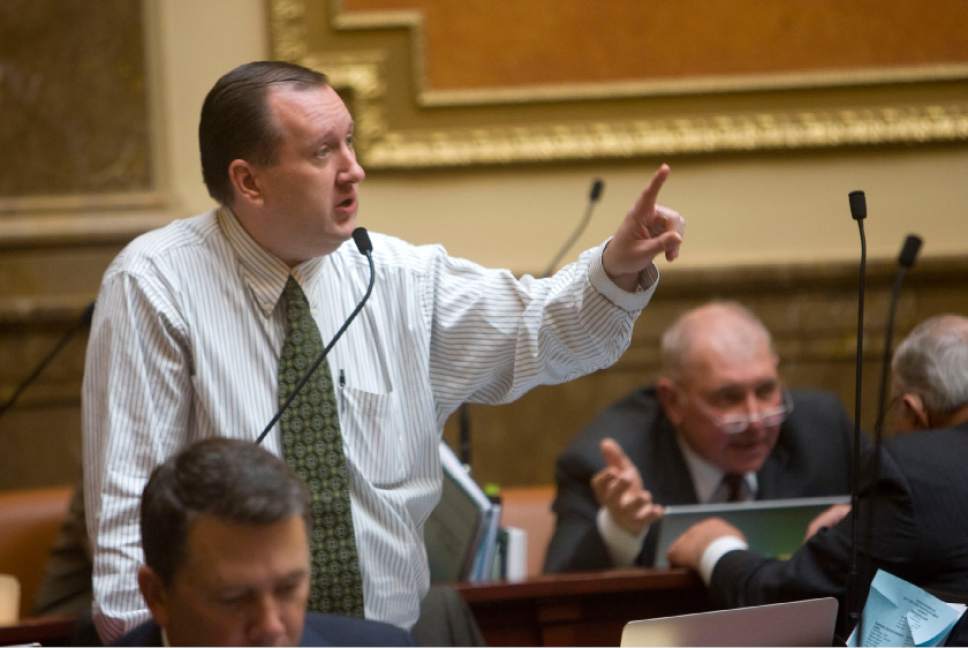This is an archived article that was published on sltrib.com in 2015, and information in the article may be outdated. It is provided only for personal research purposes and may not be reprinted.
Utah's governor, attorney general and state auditor are recommending the Legislature consider raising the caps on damages the state pays when it is sued for injuries stemming from government negligence.
Gov. Gary Herbert said the Legislature should "take a look at the caps and review if the caps are adequate and whether they should be adjusted and modified, and it's time for a review of the cap aspect of it."
The move came as the three elected officials heard a pair of claims against the state seeking a total of $7.8 million in damages stemming from a pair of incidents — one in which a boy fell 40 feet onto his head at a fair at the State Hospital, the other a serious crash involving a school bus that left a driver badly injured.
State law limits the government's liability in injury cases to $703,000 — it has been adjusted upward over time — but gives the Legislature the ability to award more in special circumstances, although that is rarely done.
In one case, a 13-year-old Boy Scout named Brenden Yates was with a church group in 2009 visiting the Utah State Hospital, where a rope obstacle course and large rope swing had been constructed. The rope swing was tethered between two 50-foot poles and participants wearing a harness clipped with two carabineers were hoisted up and released, swinging down to the ground.
But the operator erred in clipping the carabineers on Yates' harness, and he was hoisted 40 feet up and dropped on his back and head. He suffered numerous fractures and bleeding in his spine and skull. His brother, who was nearby and witnessed the fall, has been treated for post-traumatic stress disorder, as well.
Yates' family was paid the maximum under the cap, about $620,000 at the time, and is now seeking $4.4 million for past and future medical expenses, loss of income and pain and suffering.
In the other claim, 31-year-old Monica Larsen was driving in Salem, Utah, in 2011 when a school bus failed to stop at a stop sign, hitting Larsen's car at a 90-degree angle, pushing the car across the road onto the shoulder. Larsen suffered a traumatic brain injury in the accident.
Larsen received nearly $650,000, the maximum allowed under the cap in place at the time, plus another $200,000 from insurance payments. Her husband is asking the Board of Examiners and the state Legislature to award an additional $3.4 million for ongoing medical expenses and loss of income.
The Board of Examiners, made up of Herbert, Attorney General Sean Reyes and state Auditor John Dougall, reviewed the claims Friday and recommended on a 2-1 vote that the Legislature award additional money, but did not make a specific recommendation on the amounts.
"I can tell you … that I think we're not adequately staffed here or have time or expertise to actually give a recommendation," Herbert said. "It could be a lot, it could be a little."
Dougall voted against awarding any additional compensation in either case. He said there was conflicting information in the filing and the dollar figures requested seemed excessive.
"It's a combination of all those that has caused me to say that I'm not compelled to go above and beyond the caps in these two cases," Dougall said.
The board's recommendation will go to the Legislature's top budget committee, which will decide how to handle the claim.
Sen. Lyle Hillyard, R-Logan, the co-chairman of the budget committee, said he thinks the caps are too low and he would support doing away with the liability limits altogether.
"I've always said when somebody gets severely injured and there's three entities that pay for it," he said. "One is the wrongdoer. Two is the person themselves because no amount of money is going to compensate for some injuries. How do you compensate someone who is dead? And three is society."
Hillyard, who is an attorney, said he thinks Utah juries are sensible and can be trusted not to hand out exorbitant damages.
"For me, personally, I'd do away with caps on all of them," he said.
Twitter: @RobertGehrke



